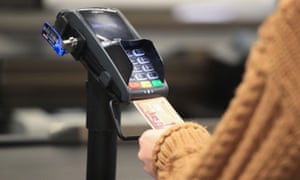Half of all cardholders opposed cashless debit card in trial site in
mid-north Queensland as questions remain about its effectiveness
The findings of a report into the federal government’s cashless debit
card, which was quietly published a day after the controversial scheme
was extended, have added weight to claims the card is causing welfare
recipients significant stigma and stress.
The government-commissioned report of the Bundaberg and Hervey Bay trial site, conducted by University of Adelaide researchers, finds a mixed reaction to the program, which has forced welfare recipients to be paid 80% of their benefits via a card since January last year.
Based on qualitative interviews with 74 organisations and 66 potential or current cardholders, the researchers acknowledged it only captured a brief snapshot of the card in Bundaberg and Hervey Bay and was primarily aimed at “understanding of the conditions within the region just before the introduction of the CDC”.
But it noted that about half of cardholders who were interviewed opposed the trial, while one fifth said they supported it.
Cardholders interviewed by the researchers complained about stigma,
technical problems, and that income management meant they were not left
with enough cash, issues which have long been raised by critics of the
policy.The government-commissioned report of the Bundaberg and Hervey Bay trial site, conducted by University of Adelaide researchers, finds a mixed reaction to the program, which has forced welfare recipients to be paid 80% of their benefits via a card since January last year.
Based on qualitative interviews with 74 organisations and 66 potential or current cardholders, the researchers acknowledged it only captured a brief snapshot of the card in Bundaberg and Hervey Bay and was primarily aimed at “understanding of the conditions within the region just before the introduction of the CDC”.
But it noted that about half of cardholders who were interviewed opposed the trial, while one fifth said they supported it.
“Indeed, some CDC participants said that they did not want to use the card at all and were planning on giving the card to another family member to use on their behalf to avoid this perceived shame.”
Others raised concerns about what the researchers described as “systematic delays in the payment of transactions under the CDC were experienced by participants”.
About one fifth of participants who were interviewed said they supported the trial, listing potential benefits such as “reducing drug and alcohol use, and improving the well-being of families” .
“Others welcomed the card as they felt that it may assist them personally with managing their money better,” the report said.
The report was quietly published on the Department of Social Services website on Wednesday, a day after the government announced an extension of all cashless debit card trial sites for a further six months. It also announced plans to introduce tap and go technology and a 1% interest rate for account holders.
It says the policy, which quarantines up to 80% of a person’s welfare payment on a card that cannot be spent on alcohol or gambling, will reduce social harms.
The government has faced pressure over the evidence base for the card, following a 2018 auditor general’s report that said a previous evaluation of the policy was so flawed it could not be used to determine whether the policy reduced social harms.
Labor’s social services spokeswoman, Linda Burney, told the Guardian the new report “sheds no further light on – and the government remains unable to demonstrate – the efficacy of the cashless debit card”.
“We are worried that the government is going to force this card on more and more people, who are struggling to pay the bills and get back to work at this time,” she said.
Noting that the researchers had interviewed more “stakeholders” than participants, the Greens senator Rachel Siewert, a long-time critic of the card, said it was “incredibly frustrating” the study canvassed people’s “perceptions”.
“We need social policy based on outcomes, not perceptions,” she told the Guardian.
The researchers noted the report “mainly captures perceptions around what the anticipated impact of the [cashless debit card] would be of stakeholder representatives and also people who had either very recently become CDC participants or were waiting to be placed on the card”.
A spokeswoman for the social services minister, Anne Ruston, said the report included data that would help work out how effective the card was.
“A number of those interviewed perceived the Cashless Debit Card as a useful tool to help with financial management, that it could enhance individual and family well-being and deliver positive impacts such as addressing alcohol and drug misuse and improved child welfare and wellbeing,” she said.
She said the card had been redesigned to remove the Indue logo and “looks and works similar to any other bank card”.
“The decision to extend the existing trials for six months was made in the context of the Coronavirus pandemic,” the spokeswoman said.
A separate study by researchers from four universities, who interviewed 114 participants in cashless debit card trial sites, found the “empirical case for continuing with the current policy settings on [compulsory income management] is weak”.
The cashless debit card trial began in Ceduna, SA and East Kimberley, WA in 2016, but income management through the similar Basics card was rolled out in remote Indigenous communities during the NT Intervention. It is also operating in the Goldfields, WA.
Ruston ordered last month that new welfare recipients would not be placed on the card during the Covid-19 pandemic.

No comments:
Post a Comment